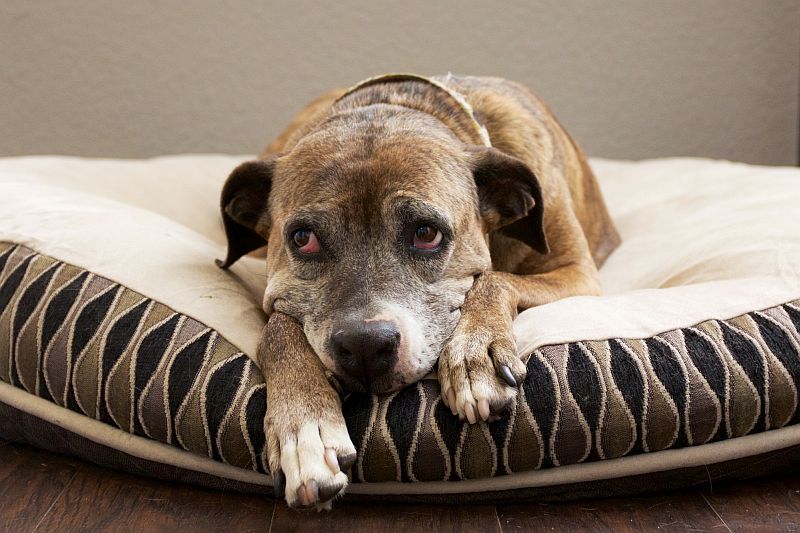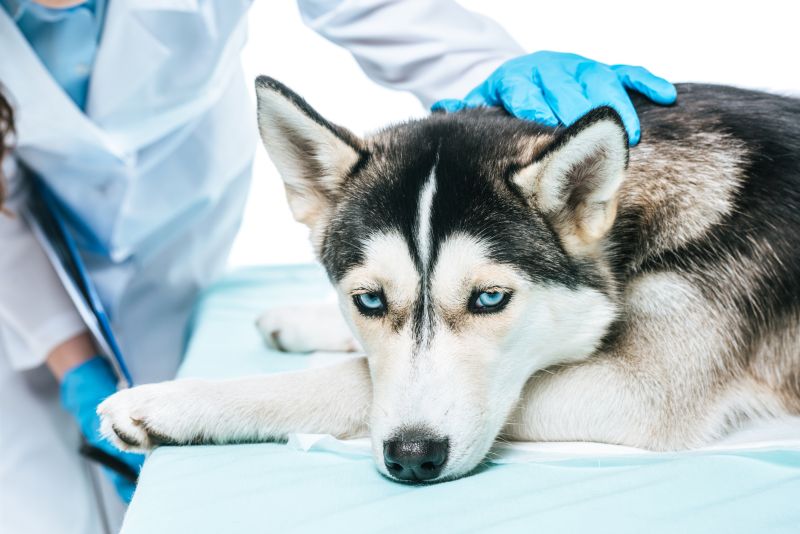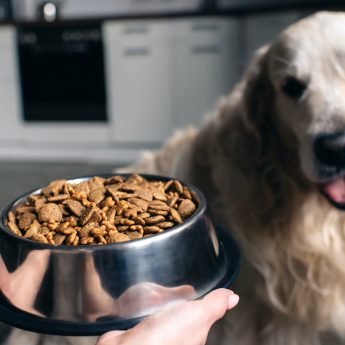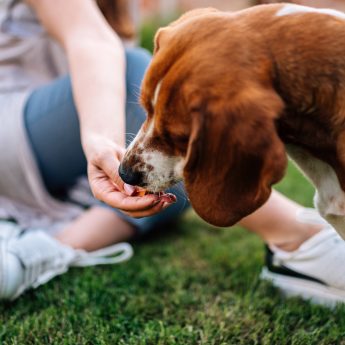From time to time, many dogs lose their appetite and begin refusing food. This is understandably upsetting for many owners, who often start to wonder how long their dog can survive without eating.
In many cases, these types of fasts will resolve themselves in short order, and your pup will begin chowing down as he normally would and emerge no worse for the wear.
But at other times, it can be a signal that something is wrong – perhaps seriously so.
We’ll try to help you below, as we explain everything you need to know about food refusal in dogs, including why it occurs, what you should do about it, and when to worry.
How Long Can a Dog Go without Eating: Key Takeaways
- If otherwise healthy, most dogs can go about 3 to 5 days without eating food.
- Puppies and dogs who’re pregnant, nursing, or suffering from underlying health problems may not be able to survive as long without food.
- There are a number of things you can do to help tempt your dog to resume eating, but if none work, your vet may need to tube-feed your pup.
How Long Can a Dog Go Without Eating?
All dogs are individuals who vary in a million different ways.
This makes it difficult to make broad generalizations about how long a particular pooch can go without eating, and veterinarians typically treat inappetence (reduced appetite) and anorexia (food refusal) on a case-by-case basis.
That said, most healthy dogs will be able to survive for about 3 to 5 days without eating food.
However, dogs who are underweight, sick, very old, or very young, may not be able to last quite so long and require veterinary care sooner than the 3- to 5-day guideline.
Similarly, dogs who’re pregnant, have recently given birth, or are nursing will also need food sooner than regular pooches in good health.
Reasons Why a Dog Won’t Eat
The list of reasons that a dog won’t eat would stretch from one end of the internet to the other, but we’ll share a few of the most common causes of food refusal below.
1. Medical Issues
The most concerning reason that your dog may be refusing food is that something is wrong with his health.
An incredible number of health problems can trigger food refusal, so we can’t list them all. But here are a few of the most notable:
- Stomach upset
- Bacterial, viral, or fungal infection
- Pain
- Dental issues
- Allergies
- Autoimmune disease
- Parasites
- Intestinal obstructions
- Cancer
- Organ failure
We mention medical issues first, as they’re the most important reasons for food refusal to address.
However, it is important to avoid panicking, as many dogs stop eating for other reasons, which we’ll address below.
2. Mental Health or Emotional Issues
Stress, anxiety, depression, and other mental and emotional health problems can cause dogs to stop eating. This shouldn’t be surprising – people often lose their appetites when experiencing these same struggles.

Fortunately, mental and emotional health issues are often treatable. In many cases, you’ll be able to do so on your own by simply figuring out what is causing your pooch to feel distressed or down in the dumps and making appropriate changes.
For example, if your dog is depressed, you may find that simply spending more time playing with him, treating him to a super-cool new toy, providing more exercise, or going on a fun outing may help him feel better.
Similarly, if you determine that loud noises or a nearby construction project is causing him anxiety, playing some mellow music or white noise may help him relax.
3. Medications
Some medications can reduce your dog’s appetite or make him feel nauseated, and therefore disinterested in eating. If your dog is taking regular medications, start by checking the label for language warning as much.
It’s also a good idea to contact your vet and let him or her know that your dog seems to have lost his appetite.
This will not only keep your vet in the loop, but your vet may be able to change your dog’s prescription to another medication that won’t disrupt his appetite.

4. Female Reproductive Issues
Although it isn’t terribly common, female dogs who’re in heat or at varying stages of their reproductive cycle may refuse food or eat less than normal (conversely, they may also exhibit an increased appetite).
5. Time of Day
You probably don’t want to wake up and eat a three-course dinner first thing in the morning, and your dog may exhibit similar time-related issues with his appetite.
I often find that my own dog seems to wait until relatively late in the evening to eat, no matter when I offer her food.
If you suspect that your dog isn’t eating because of the time of day, consider altering his feeding schedule. You may even consider getting an automatic dog feeder so that your dog can always be fed at the time of his preference.
6. Social Issues
If you have more than one pet, it is important to consider whether social disharmony is causing him to stop eating. For example, another dog may be subtly or overtly intimidating him at mealtimes.
If you determine that this is the reason your dog isn’t eating, you may need to start feeding your pets in separate rooms or at separate times.
It may also be helpful to provide a little more “space” for your pets. You may, for instance, want to separate them for a few hours each day to help prevent them from getting on each other’s nerves.
7. Change in Food
Changing your dog’s food may cause him to stop eating for a while. This is a pretty common problem, and it’s usually not difficult to address.
Many dogs will start consuming their new food more eagerly over time, but the best way to address this issue is by simply making food changes gradually.
You can do so by mixing in increasing amounts of your dog’s new food with his old food. A typical food-transition regimen may unfold as follows:
- Day One: 100% old food
- Day Two: 75% old food and 25% new food
- Day Three: 50% old food and 50% new food
- Day Four: 25% old food and 75% new food
- Day Five: 100% new food
You may want to make the transition even more gradual – just use your best judgement.
8. Spoiled or Contaminated Food
Dogs may occasionally refuse to eat because there is a problem with the food you are offering. If your dog won’t eat her food but will take treats, kibble that’s gone bad could be one of the reasons!
It may be old or spoiled, or it may have become contaminated with bacteria or fungi. It may even have become fouled with dangerous or foul-tasting chemicals.
If you suspect this may be the case, look at the food closely for any signs that something is amiss.
- Is it discolored?
- Are there any visible molds or fungi present?
See if you can detect any unusual odors associated with the food too. Just understand that your dog’s sense of smell is many times more powerful than your own, so he may be able to detect off-putting-odors that you’d never notice.
If you have any reason to suspect that something is wrong with your dog’s food, stop offering it to your pooch.
Keep the bag or can the food came in and contact your vet. Save a sample of the food in a plastic bag for analysis if possible.
9. Pickiness
Although it is a more common problem for cats than dogs, canines can be picky about their food.
If you have more than one pooch, you may have seen this first-hand. One dog will eat roadkill if you let him, while the other will only eat dinner if you spruce it up with some olive oil and heat it up a bit in the microwave.
Note that this can occasionally happen “out of the blue.” Your dog may have eagerly gobbled up a given recipe for months or years, and then suddenly start refusing to eat it.
Fortunately, pickiness isn’t usually a serious medical problem. It may, however, be a pain in your butt.
You may just have to experiment with more enticing fresh dog food, high-quality human-grade dog food, or begin adding some tasty toppers to your pup’s meals to get him to eat.
10. Who Knows?
As mentioned earlier, sometimes dogs refuse food for unknown reasons. Our dogs can’t talk to us, so short-term fasts often resolve without us ever figuring out what the problem is.
This is obviously a pretty unsatisfying answer, but it is what it is. Just accept the fact that there are some things about your dog you will never understand.
Let me know if you figure out how to actually do that.
What Should You Do if Your Dog Won’t Eat?
Given that inappetence affects dogs differently, you’ll want to use your judgement when trying to determine a specific plan of attach for your fasting pooch.
With that said, you’ll generally want to do something like the following:
1. Don’t panic.
Remember that dogs often refuse food for short periods of time without suffering any long-term effects. As long as your dog is acting normally and isn’t exhibiting signs of illness, a one- or two-day fast isn’t a big problem.
As put by Ann Hohenhaus, staff veterinarian at Animal Medical Center in New York:
“If your dog goes a couple of days without eating and nothing else is wrong — no vomiting, diarrhea, coughing, no having accidents — then I’m not that worried about it,” says Hohenhaus.
2. Try to determine the reason your dog has stopped eating.
Examine your dog’s food, consider your recent daily life, and check the label on any prescriptions your pup has had.
If you’re able to determine the reason your dog has stopped eating, you can likely make changes to help restore his appetite.
3. Consider trying to tempt your dog with a favorite food or treat.
It’s often worth trying to determine if pickiness or similar issues are causing your dog to refuse food. So, consider seeing if he’ll eat a hot dog slice or two, a piece of cheese, or a bit of cooked chicken.
If he readily gobbles them up, it means food-related issues may be the root of the problem.
4. Contact your vet if your dog won’t eat for about 48 hours.
If your dog continues to refuse food for two days, go ahead and contact your vet and solicit his or her advice.
Of course, this plan of attack assumes your dog is healthy and not exhibiting any troubling medical symptoms. If you think your dog is sick for any reason, contact your vet immediately.

What Do Vets Do for a Dog Who Won’t Eat?
If your dog’s food refusal lasts longer than two days (or he exhibits any other troubling symptoms while also refusing food), you’ll want to take your dog in for veterinary care.
Once there, your vet will likely begin trying to determine the reason your dog has stopped eating.
This will usually mean performing a physical examination, taking a medical history, and – potentially — ordering a variety of diagnostic tests. With luck, your vet will be able to determine the root cause of the issue and recommend an appropriate treatment strategy.
If your dog is suffering from a serious health problem or does not begin eating voluntarily, your vet may install a feeding tube.
By doing so, the veterinarian’s staff can ensure that your dog remains adequately nourished, while they work to determine and correct the problem.
***
Food refusal can certainly cause owners anxiety, but it is important to understand that most short-term fasts are no big deal.
Dogs occasionally skip meals for a variety of reasons, and – as long as they’re otherwise healthy – you needn’t worry if your dog decides to skip dinner or breakfast.
Just be sure to keep a good eye on your pooch, watch for any other troubling symptoms, and contact your vet if the fast exceeds about 48 hours or so.
We hope you’ve enjoyed this article, and we encourage you to share it with friends and family if you found it helpful.
Has your dog ever started refusing food? What was the reason? Was he simply being picky or did it turn out that he was sick? Did you do anything special to get him to start eating again?
Let us know about your experiences in the comments below!








No Comments